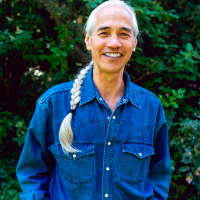View this post on Instagram
As we sit down with friends and family to give thanks for making it through another tough year, here are some reflections on gratitude to help us navigate the stress of the holidays.
Positive psychology studies consistently demonstrate that gratitude is strongly associated with greater happiness.
People who are grateful are more optimistic, have fewer doctor visits, and are more likely to report an overall sense of well-being.
Not surprisingly, those who receive gratitude also benefit. Employee performance and productivity increase when workers feel appreciated.
Now let’s look beneath the hood and investigate why gratitude works.
Though saying, “Thank you” to someone who holds open a door, offers assistance, or shares a kind word only takes a second, it radically changes our relationship to the cosmos. It interrupts our obsession with self-importance and honors the other.
Saying “thank you” is an act of bowing that ennobles both the giver and the receiver.
I witnessed a vivid example of this when I was commuting to Denver on the bus. In the midst of the morning bustle, most of the passengers greeted the bus driver with a cheerful “good morning” or other polite gesture, which the driver returned. Getting off the bus, passengers said “thank you.” With this simple human exchange, what could have been a dehumanizing, daily cattle ride was transformed into a pleasant, dignified journey.
My time in Thailand also taught me about gratitude. A common Thai word is “cop,” in men’s speech, and a softer “ka” for women. It expresses thanks, respect, and politeness, and is liberally sprinkled throughout a conversation at the ends of sentences. Such profuse verbal bowing reflects the gentle kindness characteristic of the Northern Thai culture and goes a long way toward easing friction between people.
Alan Watts tells an amusing story of traveling around Kyoto visiting holy sites with a Japanese Zen monk. At each shrine they passed, large or small, the monk bowed low. The mischievous fellow that he is, Watts teases the monk, “Why do you bow before these stone Buddhas? I just as soon spit.” (Watts is alluding to a Zen parable where Buddha is described as “dry sh*t on a stick.”) The monk smiles good-heartedly and in broken English says, “I bowz; you spitz!”
For the nonattached, differences of opinion are not a problem.
In contrast, when we think ours is the only correct view, conflict is inevitable. It leads to disrespect, which can easily morph into anger, or its silent cousin frustration. Anger is the mirror opposite of gratitude, where the offended party self-righteously elevates themselves above the accused. In the toxic exchange, both suffer—the accused directly, and the accuser more subtly—because to feel superior cuts us off from the source of love and fulfillment and relegates us to a barren, ego castle.
One of the great paradoxes of pleasure is that the more we get things just the way we want them, the harder it is to enjoy what we have.
We often see this paradox in the discontent of the privileged, who can never seem to get enough. As I describe in my book, desire (wanting) is the handmaiden of the ego and is always reaching toward the future (seeing the glass as half empty). Yet, we can only experience pleasure in the present moment (the glass half full). To arrive at the present moment fully is to tip our heads back and drink the water. To drink the water is to abandon ourselves to it.
Gratitude loosens the grip of our ego fixation and puts us in the optimal relationship to the cosmos to enjoy it.
Here are some ways to cultivate gratitude and enrich your life:
1. Practice saying “thank you” until it becomes comfortable and second nature.
2. Before a meal, at the end of a spiritual practice, upon entering or leaving a sacred space, bow in your own way as a gesture of respect to your surroundings and to yourself.
3. When you bow (outwardly or inwardly), breathe into the feelings of gratitude and allow them to fill your being. In this way, you, yourself, become a sacred vessel.
4. Be thankful for what you have, and when you toss back a glass of holiday cheer, give yourself, fully.
5. And if someone happens to spitz on your opinion, don’t take it personally.
6. As Rumi reminds us, “There are hundreds of ways to kneel and kiss the ground.”
For more details about my book, aah…The Pleasure Book, visit the link in my bio.











Read 2 comments and reply